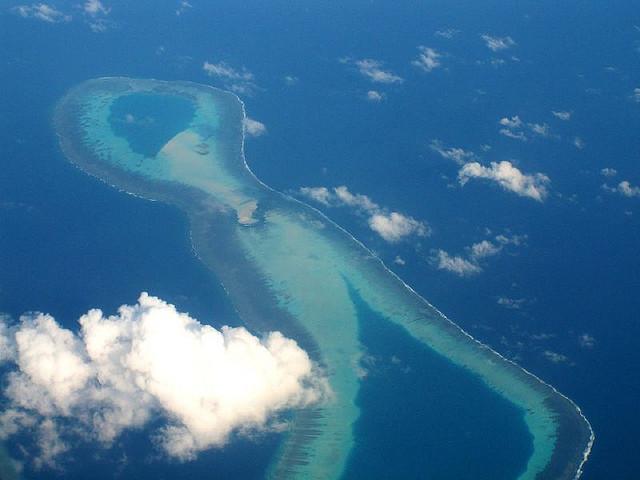Chinese public opinion on the East China and South China Seas
Posted By Graeme Dobell on March 10, 2015 @ 06:00
 [1]
[1]It’s now possible to do public-opinion surveys in China on everything from pandas to pensions. So why not slip in some questions about the territorial disputes in the South and East China Seas?
That’s what Andrew Chubb and the Perth USAsia Centre have done with 1,413 adult residents of Beijing, Shanghai, Guangzhou, Changsha and Chengdu. The job was carried out by a Chinese commercial firm and the questions were part of a survey that also looked at wildlife issues and age pensions.
The first edition of what’s planned to be a regular survey—if the censors will allow—is ‘Exploring China’s “Maritime Consciousness” Public Opinion on the South and East China Sea Disputes [2]’. This look into the mind of the Chinese public can both confirm the pessimists and comfort the optimists.
On the basis of this first session with the national psyche, Chubb concludes that ‘the Chinese public appear to be less war-hungry on these disputes than commonly assumed. Only two policies failed to receive majority approval, one was the official shelve dispute policy, the other was send in the troops’. Solid majorities supported compromise and arbitration, and even ‘nationalist’ public opinion is judged ‘surprisingly rational’.
Among the findings:
- Significantly more support for compromise and UN arbitration than for military force;
- Online coverage of the disputes—more inflammatory and critical of government weakness—doesn’t represent public opinion but may influence opinion;
- Television remains the most influential medium, supplying 90% of information. ‘Given that TV continues to be one of the most tightly-controlled mass media in China, this suggests the party-state retains significant means to shape trends in public opinion on foreign affairs issues, even in the Internet era.’
- Chinese youth may be more nationalistic than their predecessors but less warlike.
The survey offers intriguing information on how the maritime issues rank, the way the disputes have merged in public consciousness and their framing as issues of ‘personal and national humiliation’.
Putting the island disputes in context, see how those surveyed ranked China’s big problems. The top three are: corruption (84.3%), the rich-poor disparity (79.7%), and food and drug safety (71.9%). Next, still getting a majority: social practices and moral issues (53.1%), environmental pollution (52.9%) and the issue of sovereignty over disputed islands (51.2%)
The two least-selected items were continued economic development (38.3%) and cross-strait unification (22.9%), reflecting the ‘belief that current trends in these areas are generally positive’.
This glimpse into the Chinese psyche means I’m going to make more effort to conceptualise two different disputes in two different locations as one big issue. My mental shorthand has the East China Sea as a geopolitical game of ‘chicken’, the history war being waged over rocks held by Japan, a bilateral face-off weighted to Tokyo by the fact of possession and explicit alliance backing from the US.
The South China Sea is multi-dimensional chess where China has shifted from a ‘salami slicing’ approach and is now making big pizzas—adding ever more layers of ownership by constructing airstrips, helipads and troop facilities. The imagery from IHS Jane’s 360 [3] shows how China’s pizzas/fortresses are expanding across the Spratlys.
The Perth USAsia Centre work found that the Chinese public pay almost equal attention to the South China Sea as they do to the Diaoyu Islands. Most respondents felt it was not in China’s interests for military force to be used. But if fighting starts, 87% believe the Chinese military already had the capability to ‘retake’ the Diaoyus, and 85% think China would win in the South China Sea. When US military involvement was raised, there was a 13% drop in confidence about military victory.
The Chinese respondents overwhelmingly agreed that the island disputes are matters of state and national dignity, representing a continuation of the ‘century of humiliation.’ And a majority said they felt personally humiliated by the status quo in the disputes. Chubb comments:
The Chinese public appears to be inclined to frame the country’s maritime disputes in terms of national and personal humiliation, independently of official media cues. For the party-state this may be a “double-edged sword”. On one hand, the campaign to raise awareness of China’s history of humiliation does appear to be showing real results. At the same time, however, it also suggests the Mainland public’s interpretation of future events will probably be framed in this way, whether the official media emphasize the connection or not.
The second edition of the survey is supposed to happen this year, although the Chinese censors are doling out large doses of delay. May they quickly agree. A regular check on China’s maritime consciousness will be a valuable bit of the puzzle.
Graeme Dobell [4] is the ASPI journalist fellow. Image courtesy of Flickr user Storm Crypt [5].
Article printed from The Strategist: https://aspistrategist.ru
URL to article: /chinese-public-opinion-on-the-east-china-and-south-china-seas/
URLs in this post:
[1] Image: https://aspistrategist.ru/wp-content/uploads/2015/03/837420339_4a7d73a54d_z.jpg
[2] Exploring China’s “Maritime Consciousness” Public Opinion on the South and East China Sea Disputes: http://perthusasia.edu.au/usac/assets/media/docs/publications/2014_Exploring_Chinas_Maritime_Consciousness_Final.pdf
[3] imagery from IHS Jane’s 360: http://www.janes.com/article/48984/imagery-shows-progress-of-chinese-land-building-across-spratly
[4] Graeme Dobell: https://www.aspistrategist.ru/about-aspi/aspi-staff/fellows/graeme-dobell
[5] Storm Crypt: https://www.flickr.com/photos/storm-crypt/837420339
Click here to print.